Lady Gets Accused By Mother-In-Law Of Faking Her Cat Allergies, Proceeds To Get Two More Cats
Allergies can strike at any time during a person's lifetime. Your immune system is a constantly changing organ that retrains itself, so it's not always clear why some people develop allergies later in life when they didn't have them previously.
As a result, allergies may be triggered by changes to the internal and external environments of the human body. Consequently, it is possible to develop an allergy to cats overnight.
For the OP of today's story, she has cat allergies. Cat dander, saliva, or urine are among the specific cat products to which people with cat allergies react.
Allergens are the compounds that trigger these reactions. A cat allergy can result in symptoms ranging from minor respiratory issues to a syndrome that poses a life-threatening risk.
Anyone who comes into contact with a cat and experiences breathing difficulties or a feeling of choking should go to the hospital right away. Even after the cat has left the room, a person allergic to cats may still experience symptoms.
This occurs due to the propensity of cat dander and other cat allergens to settle on carpets, rugs, unwashed clothing, and linens. This was the OP's case, but her MIL thought she was faking it to avoid visiting her and her boyfriend.
Keep scrolling down to read the full story.
The OP kicks off her story with this headline

The original poster can't detail everything in the story, but several people in her life have acknowledged her MIL as being a narcissist

The OP just cannot deal with the cat allergy issue, so she had to get an EpiPen from a doctor due to the severity of the allergy

Understanding Allergies and Authenticity
Allergies can be a serious medical condition, and misunderstanding them can lead to conflict in relationships. Research shows that when individuals feel their health concerns are dismissed, it can lead to feelings of frustration and isolation.
According to studies published in the Journal of Allergy and Clinical Immunology, awareness and understanding of allergies are crucial for fostering supportive relationships.
The Challenge of Allergy Validation
The accusation of faking allergies raises important questions about validation and respect for personal health concerns. Research indicates that individuals often experience anxiety when their health conditions are doubted, which can exacerbate existing symptoms. According to studies published in the Journal of Abnormal Psychology, being invalidated can lead to feelings of frustration and isolation.
This dynamic is particularly important when dealing with allergies, as they can significantly impact a person's quality of life.
And the comments from other Redditors roll in...

OP's MIL and her partner do not seem like people worth visiting
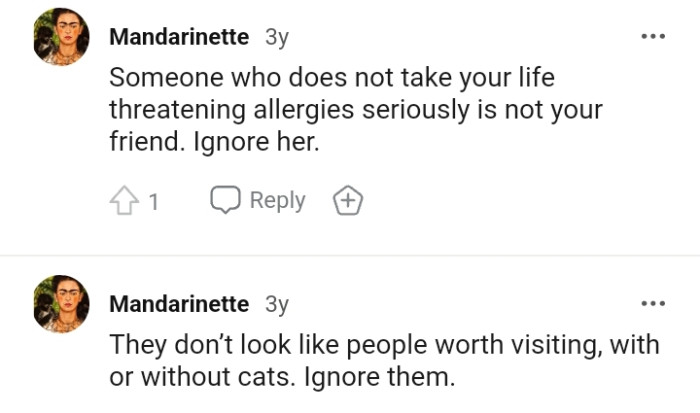
Allergies are exacerbated by stress, which the OP's MIL loves to pile on
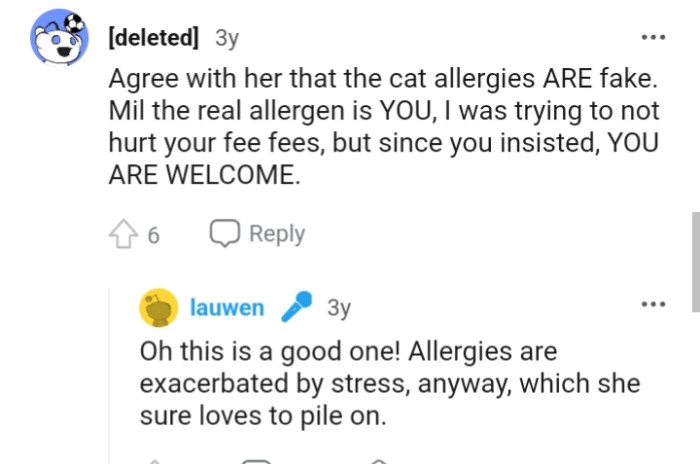
When someone accuses another of faking allergies, it can reflect deeper insecurities or misunderstandings about health issues. A clinical psychologist might suggest that this behavior often stems from a lack of awareness or empathy.
Encouraging open discussions about health issues can help mitigate misconceptions and promote a more supportive environment.
From a psychological perspective, the mother-in-law's behavior may reflect a misunderstanding of the seriousness of allergic reactions. Research indicates that misconceptions about allergies often stem from a lack of education about their potential severity. This can lead to dismissive attitudes that invalidate the experiences of those suffering from allergies, exacerbating feelings of isolation and frustration.
When you no longer need allergy meds or an inhaler

From a Redditor whose mother-in-law and sister-in-law had a big issue with the allergies
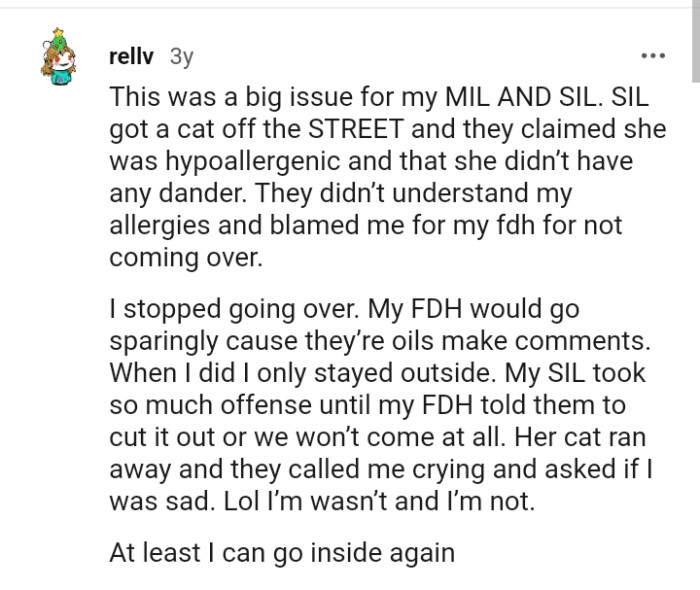
This Redditor wants to know if they ever visited her in her own home
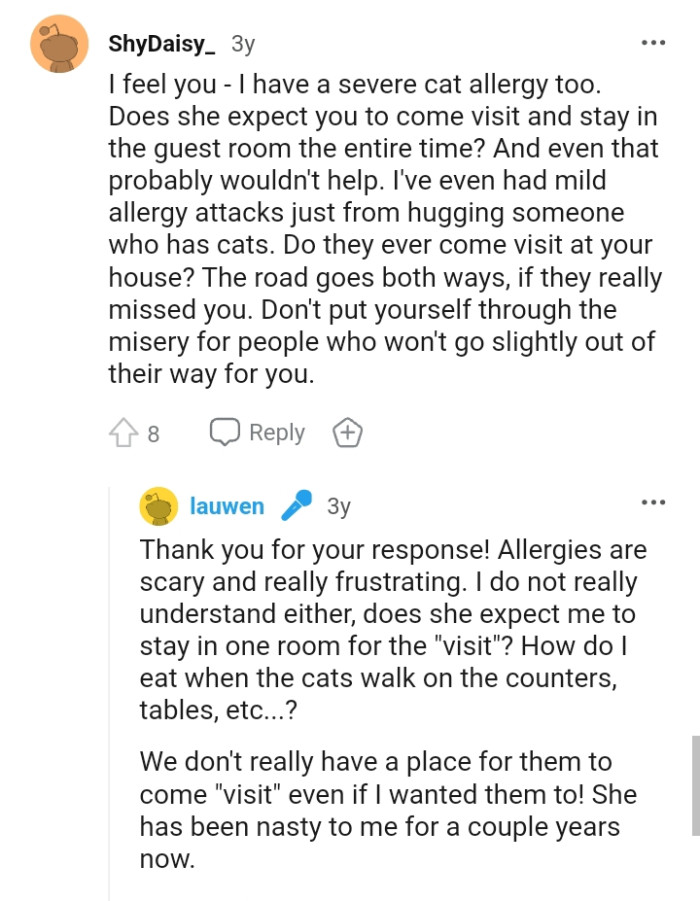
The Role of Empathy in Relationships
Empathy plays a vital role in fostering healthy relationships, particularly when health issues are involved. Research indicates that empathic communication can significantly improve understanding and reduce conflict.
According to Dr. Brené Brown, fostering vulnerability and empathy is essential for creating connections that allow for open dialogue and mutual respect.
The Importance of Communication in Family Dynamics
Effective communication is vital in navigating misunderstandings regarding health concerns. Research shows that open and respectful dialogue can foster empathy and understanding among family members. In this case, the individual may benefit from calmly explaining the nature of her allergies and the implications of exposure to cats. Using 'I' statements can help convey her feelings without escalating tensions, promoting a more constructive conversation.
The mother-in-law can say whatever she pleases, but the OP still has the right to decide if she wants to go
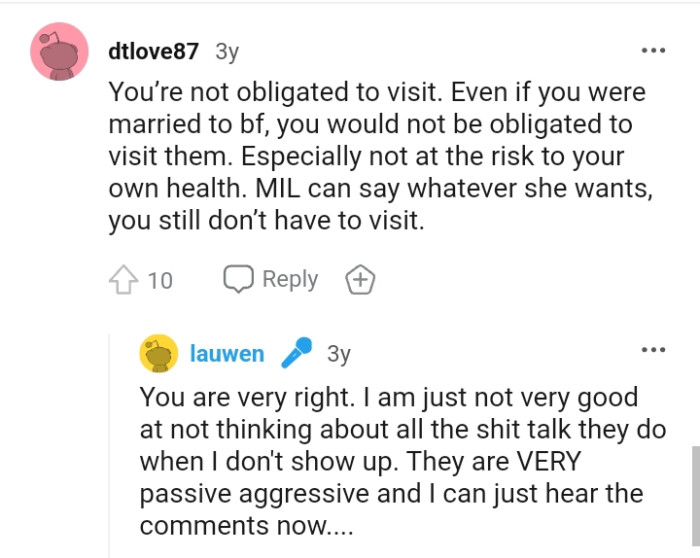
The OP should be careful if she decides to pay her a visit
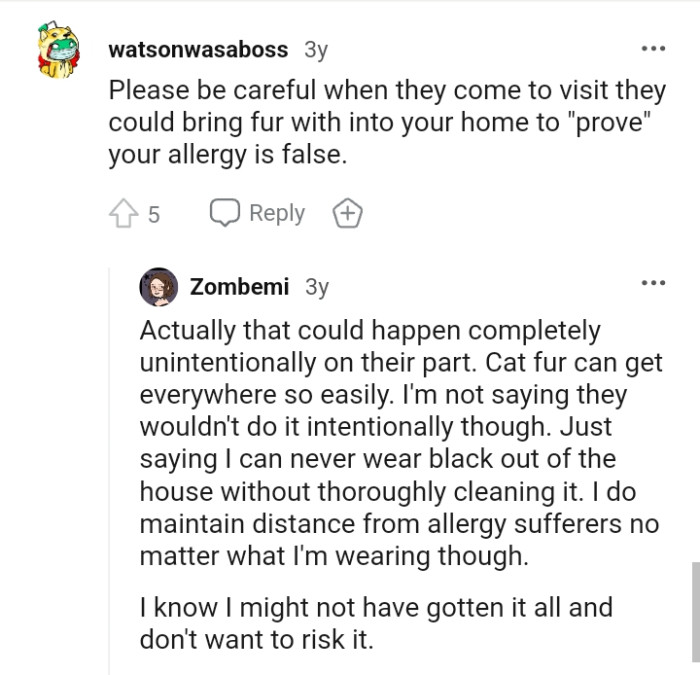
From a Redditor whose mild cat allergy started in their 20s

Practical approaches to enhancing empathy include active listening exercises and discussing each other's experiences openly. Engaging in these practices can create a deeper understanding of each other's perspectives and promote healthier relationships.
Additionally, educating family members about allergies and their implications can foster a more supportive environment.
Moreover, establishing boundaries is crucial in family interactions, especially regarding health-related issues. Studies highlight that setting clear boundaries can help protect individual well-being and promote healthy relationships. For the individual, it may be beneficial to communicate her needs effectively, emphasizing the importance of respecting her allergies while also addressing her mother-in-law's concerns.
This Redditor is suggesting what the OP should do and say in response
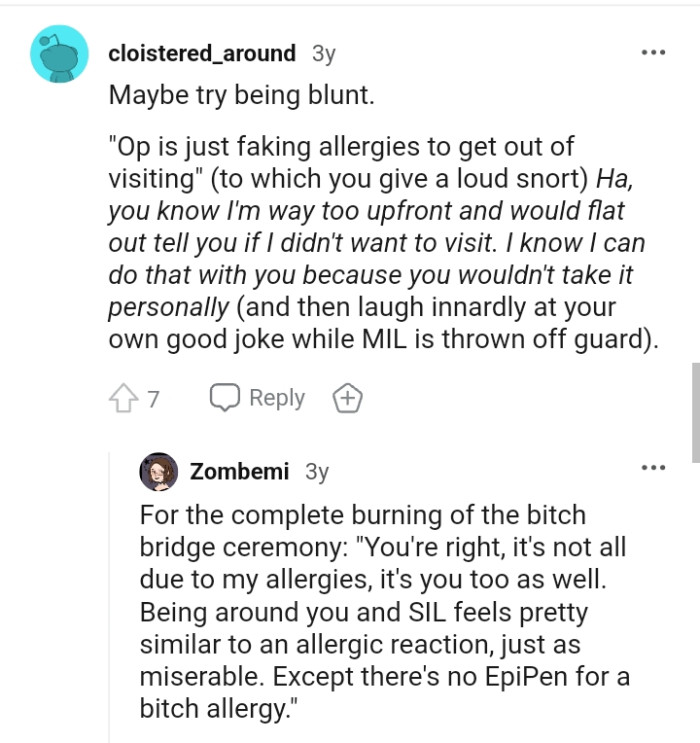
Allergies of all kinds, including allergies to cats, can appear at any point in one's life. However, the effects may not show up for several days after cumulative exposure.
The fact that the OP's MIL thought she was faking it is quite discouraging. In fact, the OP wouldn't be blamed if she decided to stop visiting because it's her life at stake here.
Navigating Family Expectations
Navigating family expectations can be particularly challenging when health concerns are involved. Research indicates that individuals often feel pressure to conform to family norms, which can lead to stress and conflict. Addressing these expectations through open communication can help alleviate some of the pressures associated with family gatherings. For instance, discussing the possibility of visiting in a controlled environment where allergens are minimized could provide a compromise that respects both parties' needs.
Psychological Analysis
The accusation of faking allergies reflects a significant misunderstanding of health needs within family dynamics. It's essential for family members to recognize and validate each other's health concerns to foster a supportive environment. Encouraging open communication about allergies can help reduce conflict and promote respect for individual health challenges.
Analysis generated by AI
Analysis & Alternative Approaches
Understanding the dynamics of health-related concerns within families is vital for fostering respectful interactions. As emphasized by research from the Journal of Abnormal Psychology, effective communication and boundary-setting can significantly improve relationship dynamics. By promoting empathy and understanding, families can create a supportive environment that respects individual health needs.
Managing Conflicts Around Health Issues
Conflict surrounding health issues can be emotionally charged and requires sensitive handling. Research in conflict resolution emphasizes the importance of approaching such discussions with empathy and understanding.
Employing 'I' statements can be particularly effective, allowing individuals to express their feelings without blaming others.
Psychological Analysis
This situation highlights the challenges of navigating health issues within family dynamics. Accusations of faking allergies can stem from a lack of understanding and empathy, leading to unnecessary conflict.
Fostering a culture of open dialogue and education around health issues is essential for creating supportive relationships.
Analysis generated by AI
Analysis & Alternative Approaches
Addressing health-related conflicts requires empathy, understanding, and open communication. By encouraging dialogue and education about conditions like allergies, families can foster a more supportive environment.
Ultimately, promoting empathy and understanding can significantly enhance relationships and reduce misunderstandings.



